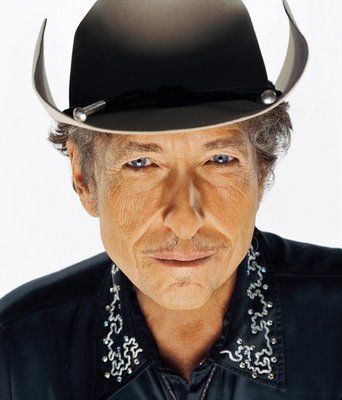Vid for the new Dylan song "When the Deal Goes Down." With Scarlett Johansson.
Hmmm. Minnesota Plates. Copy of Bound for Glory. The girl who brought out the poet in Bob?
A Country Music Death Beast and Worker in the Dylan-Industrial Complex in Sydney Australia IN EXILE
Thursday, August 31, 2006
Wednesday, August 30, 2006
Thought folks might be interested in an update on the condition of Sneaky Pete Kleinow:
“I want all the fans, musicians and media to know that my father was diagnosed with Alzheimer's about a year ago. It hit him so hard and fast that he is now living in a skilled nursing facility. He would enjoy receiving a card, photo or note from you.” - Anita Kleinow (daughter)
The address for the mail is here.
“I want all the fans, musicians and media to know that my father was diagnosed with Alzheimer's about a year ago. It hit him so hard and fast that he is now living in a skilled nursing facility. He would enjoy receiving a card, photo or note from you.” - Anita Kleinow (daughter)
The address for the mail is here.
Tuesday, August 29, 2006
Johnny Cash Movie Marathon 1
I've acquired a collection of Johnny Cash movies now numbering five, plus one TV guest starring role (no, not Dr Quinn, Medicine Woman) and it is time to let them loose on the blogosphere. There's quite a history of country singers turning their hand to acting, probably most notably Kris Kristofferson but all the Highwaymen and many others have dabbled. There is nothing in the Cash oevre to match Pat Garrett and Billy the Kid or Heaven's Gate (no really, it's quite good), but there are some high points.
First, The Pride of Jesse Hallum. 1980. Made for TV and "recommended by the National Education Council," although not the "National Traffic Council" probably given the amount of illegal driving our hero does. I saw this many times as a kid (the local video shop must've had it) but all I remember was that Cash was illiterate and learns to read and one scene in which he sounds out letters. "C for Cup." I used to like to imitate the drawl "C fer Currrrrrrrp." Still do. Buy me a few beers sometime and ask nicely.
I'm sure this film is little seen, and it's time to shine a light. Sure, it's a crappy Made For TV light which wobbles alarmingly if you make any sudden movements, but it's Cash and therefore worth 93 mins of your time.
Jese Hallum is a widowed Kentucky coal miner. Here he is, pensive at his wife's grave.
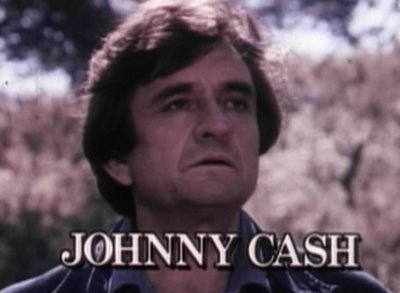
He has a Harry Kewell lookalike son Ted and a daughter with scoliosis. Here she is with a pet chicken, name of Minerva. Not related to the Chicken in Black, we hope. Without surgery she will "grow humped up and breathless."

So Jesse packs the kids into theute pick-up and heads to Cincinnati where the wee poppet goes to hospital. Jesse pays the hospital the $14,000 in cash (he can't write cheques, you see.) Ted enrols in school but Jesse makes excuses because he can't fill out the enrolment forms. He runs into the prissy school marm Vice Principal with her big words and high faluting city ways. This is star of stage and screen Brenda Vaccaro.
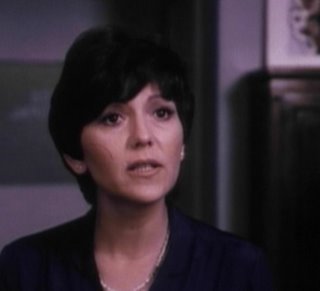
He can't get a job because he can't fill in an application or read the operating instructions.
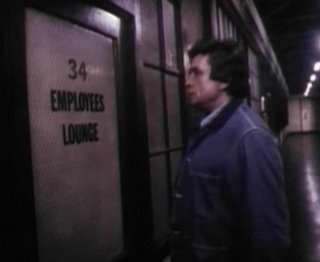
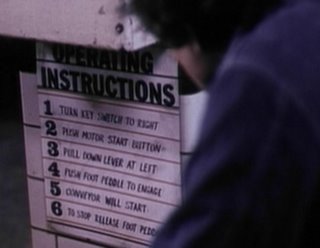
I should also say, Jesse is not just any Kentucky coalminer. He is a Kentucky coalminer from Muhlenberg County which as many people reading this (OK, as everyone reading this except people reading only because they are related to me) will know, this is a reference to the John Prine classic "Paradise."
And daddy won't you take me back to Muhlenberg County
Down by the Green River where Paradise lay
Well, I'm sorry my son, but you're too late in asking
Mister Peabody's coal train has hauled it away
How many of you are singing along right now? I knew it. Anyway, Cash sings the song in the movie and the melody is all over the place, picked out freakin' endlessly on guitar and banjo. Some might call this creating a unifying musical theme to support the narrative superstructure, others that it is labouring the beejeezbus out of the sucker. I take no sides. That banjo, by the way? ... well, see the final screenshot for who is wielding it. He also sings Billy Joe Shaver's "An Old Chunk of Coal."
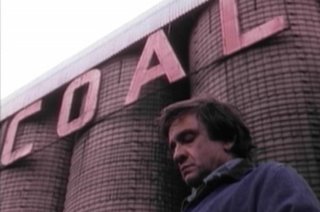
Finally, Jesse ends up at the fruit markets lugging round produce for Salvatore Galucci, played with A-Super-Mario-Brother-in-a-pasta-sauce-ad nuance by Eli Wallach. "You-a good-a boy-a Jess-a!"[insert flapping arms here] A sleazy looking Sopranos dude tries to cheat Sal with low quality apples, but Jesse exposes his game. He might not have book learning, but he was Homecoming King at the School of Hard Knocks and Apple Grading. Galucci tells sleazy dude to sling his hook, whereupon sleazy dude roughs up Galucci, whereupon Jesse lays some Kentucky thunder on his ever-lovin' fruit cheatering ass. Sometimes, you've got to fight when you're a man. Oops, sorry. That's the Kenny Rogers Movie Marathon. Next year, maybe. This earns him Sal's devotion and a promotion.
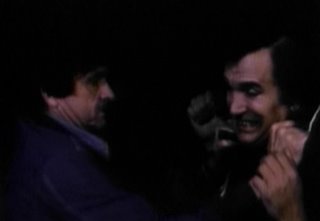
Did I mention the prissy school marm is Sal's daughter? This fact will return to assert itself as important later in the narrative.
So. What else? Oh yeah, it turns out young Ted is barely literate too but he is a track star so skated through his old school. School Marm (her name is Marian)wants to bust him back to junior high but Jesse says he's being picked on for being from Kentucky and demands he stay where he is, and the Principal -- eye on the upcoming track meets - lets him. Jesse 1 Marian 0. Conflict!
More conflict. Jesse runs a red light and is pulled over by a smarmy big city cop who gives him attitude about being a hillbilly, informs him his licence is months out of date and rips it up.
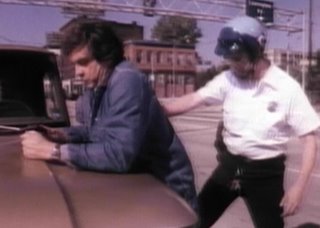
To get an Ohio licence he has to ----- take a written exam! This never happened back in the holler, where his wife did all the paperwork and a relative at the traffic bureau rubber stamped his papers. What Will Jesse Do?
Sal, not being completely stupido, twigs that Jesse can't read about 30 seconds after meeting him. He speechifies about coming to this great country as an illiterate peasant from the distant land of Upper Complete Hamovia and working hard blah blah blah man he is today yadda yadda. Long story short: learn to read or you no work for me. My Mariana, he says, she help you. Jesse nixes this idea but -- the first part in the swallowing of the titular pride of Jesse Hallum -- goes to her and she finds him lessons.
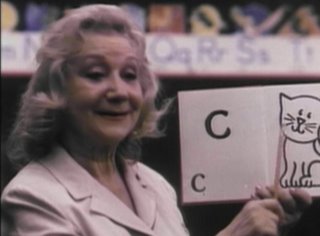
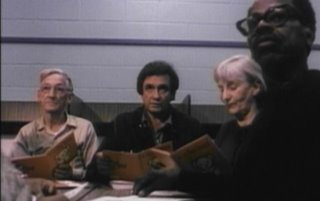
Jesse is impatient though. He can't afford the two years the teacher tells him it will take to learn. He quits. Sal lets his daughter cook him breakfast and then emotionally blackmails her into personally teaching his Jess. Ah, fathers and daughters and that delicious dynamic of guilt. She agrees.
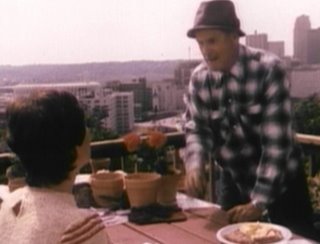
And here is the famous "C for Cup scene."
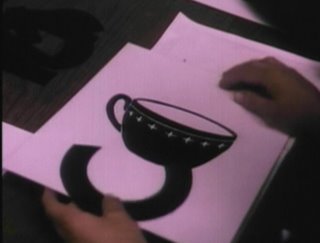
Progress is made. Jesse is happy. All this, by the way, is being kept a secret from his kids. Jesse naively thinks he has been fooling everybody all this time.

The timeline is a bit fuzzy but after a Rocky-like montage of hard studying scenes Jesse attempts to read The Wizard of Oz to his still hospital bound daughter. She's excited by this because he has never read to her, mom used to do that. Now, I was pretty disappointed with this scene. It should be the big emotional turning point; for the first time he is reading a story to his sick daughter. Halting and stumbling over words, but he's actually reading. To his joyous daughter! For the first time! But the scene is flat and not the big emotional pay off it should be. Even an average midday movie can be elevated by deft handling of such moments but the director really missed an opportunity.
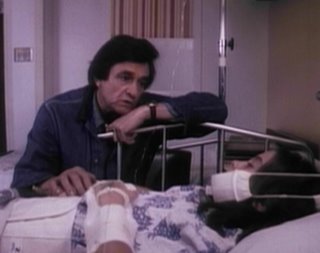
So anyway, Ted gets in more trouble and Jesse finally feels ready to take that driving test. But in the test, he pikes, loses confidence, screws up the test paper and storms out in a blaze of banjos. Damn your pride Jesse Hallum!
Then he gets in a road rage stoush and ends up in the clink. Cue banjos of regret.
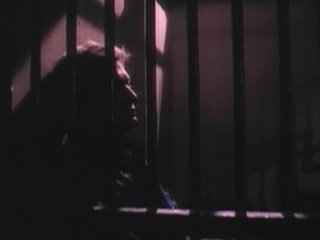
Then Ted flunks out and Jesse -- not quite so canny as ol' Sal -- gets an inkling that maybe ... just maybe Ted can't read neither. He tests his theory by making him read Psalm 40 which Jesse has memorised but Ted can hardly decipher. Jesse finally comes clean on his illiteracy to discover his kids already knew. In fact, so did everyone back in Muhlenberg County. Duh.
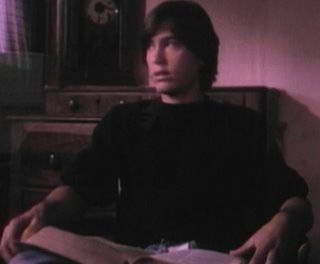
The film ends with Jesse and son in remedial reading classes at Summer school. Predictably, the class is taught by an milquetoast in a brown suit, ineffectual in front of a class of slackers with boom boxes until Cash takes control, pulls himself to full height and tells the kids they don't want to live like him.
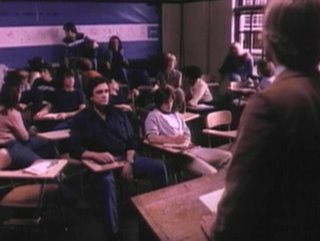
"Me and my boy -- we're going to learn to read!"
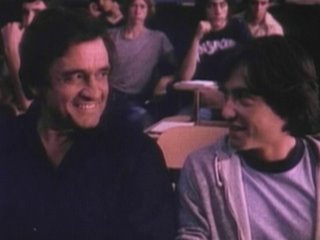
THE END
Except for the music credits. And on banjo, Mr Earl Scruggs. Cool.
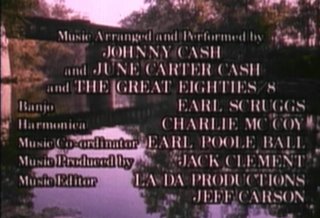
Knowing how Johnny Cash loved reading and surrounded himself with books, I'm sure the story had resonance and he's most effective when regretfully explaining the life of lies and "faking it" he had to lead to make it so far without reading, and cold reality that what worked in his old home town was not going to fly in the big city. It's probably the least interesting of all the Cash films I've seen but it's not without merit. The banjo, for instance.
First, The Pride of Jesse Hallum. 1980. Made for TV and "recommended by the National Education Council," although not the "National Traffic Council" probably given the amount of illegal driving our hero does. I saw this many times as a kid (the local video shop must've had it) but all I remember was that Cash was illiterate and learns to read and one scene in which he sounds out letters. "C for Cup." I used to like to imitate the drawl "C fer Currrrrrrrp." Still do. Buy me a few beers sometime and ask nicely.
I'm sure this film is little seen, and it's time to shine a light. Sure, it's a crappy Made For TV light which wobbles alarmingly if you make any sudden movements, but it's Cash and therefore worth 93 mins of your time.
Jese Hallum is a widowed Kentucky coal miner. Here he is, pensive at his wife's grave.

He has a Harry Kewell lookalike son Ted and a daughter with scoliosis. Here she is with a pet chicken, name of Minerva. Not related to the Chicken in Black, we hope. Without surgery she will "grow humped up and breathless."

So Jesse packs the kids into the

He can't get a job because he can't fill in an application or read the operating instructions.

Is this the Employment Office?

I should also say, Jesse is not just any Kentucky coalminer. He is a Kentucky coalminer from Muhlenberg County which as many people reading this (OK, as everyone reading this except people reading only because they are related to me) will know, this is a reference to the John Prine classic "Paradise."
And daddy won't you take me back to Muhlenberg County
Down by the Green River where Paradise lay
Well, I'm sorry my son, but you're too late in asking
Mister Peabody's coal train has hauled it away
How many of you are singing along right now? I knew it. Anyway, Cash sings the song in the movie and the melody is all over the place, picked out freakin' endlessly on guitar and banjo. Some might call this creating a unifying musical theme to support the narrative superstructure, others that it is labouring the beejeezbus out of the sucker. I take no sides. That banjo, by the way? ... well, see the final screenshot for who is wielding it. He also sings Billy Joe Shaver's "An Old Chunk of Coal."

Finally, Jesse ends up at the fruit markets lugging round produce for Salvatore Galucci, played with A-Super-Mario-Brother-in-a-pasta-sauce-ad nuance by Eli Wallach. "You-a good-a boy-a Jess-a!"[insert flapping arms here] A sleazy looking Sopranos dude tries to cheat Sal with low quality apples, but Jesse exposes his game. He might not have book learning, but he was Homecoming King at the School of Hard Knocks and Apple Grading. Galucci tells sleazy dude to sling his hook, whereupon sleazy dude roughs up Galucci, whereupon Jesse lays some Kentucky thunder on his ever-lovin' fruit cheatering ass. Sometimes, you've got to fight when you're a man. Oops, sorry. That's the Kenny Rogers Movie Marathon. Next year, maybe. This earns him Sal's devotion and a promotion.

Did I mention the prissy school marm is Sal's daughter? This fact will return to assert itself as important later in the narrative.
So. What else? Oh yeah, it turns out young Ted is barely literate too but he is a track star so skated through his old school. School Marm (her name is Marian)wants to bust him back to junior high but Jesse says he's being picked on for being from Kentucky and demands he stay where he is, and the Principal -- eye on the upcoming track meets - lets him. Jesse 1 Marian 0. Conflict!
More conflict. Jesse runs a red light and is pulled over by a smarmy big city cop who gives him attitude about being a hillbilly, informs him his licence is months out of date and rips it up.

To get an Ohio licence he has to ----- take a written exam! This never happened back in the holler, where his wife did all the paperwork and a relative at the traffic bureau rubber stamped his papers. What Will Jesse Do?
Sal, not being completely stupido, twigs that Jesse can't read about 30 seconds after meeting him. He speechifies about coming to this great country as an illiterate peasant from the distant land of Upper Complete Hamovia and working hard blah blah blah man he is today yadda yadda. Long story short: learn to read or you no work for me. My Mariana, he says, she help you. Jesse nixes this idea but -- the first part in the swallowing of the titular pride of Jesse Hallum -- goes to her and she finds him lessons.


Jesse is impatient though. He can't afford the two years the teacher tells him it will take to learn. He quits. Sal lets his daughter cook him breakfast and then emotionally blackmails her into personally teaching his Jess. Ah, fathers and daughters and that delicious dynamic of guilt. She agrees.

And here is the famous "C for Cup scene."

Progress is made. Jesse is happy. All this, by the way, is being kept a secret from his kids. Jesse naively thinks he has been fooling everybody all this time.

The timeline is a bit fuzzy but after a Rocky-like montage of hard studying scenes Jesse attempts to read The Wizard of Oz to his still hospital bound daughter. She's excited by this because he has never read to her, mom used to do that. Now, I was pretty disappointed with this scene. It should be the big emotional turning point; for the first time he is reading a story to his sick daughter. Halting and stumbling over words, but he's actually reading. To his joyous daughter! For the first time! But the scene is flat and not the big emotional pay off it should be. Even an average midday movie can be elevated by deft handling of such moments but the director really missed an opportunity.

So anyway, Ted gets in more trouble and Jesse finally feels ready to take that driving test. But in the test, he pikes, loses confidence, screws up the test paper and storms out in a blaze of banjos. Damn your pride Jesse Hallum!
Then he gets in a road rage stoush and ends up in the clink. Cue banjos of regret.

Then Ted flunks out and Jesse -- not quite so canny as ol' Sal -- gets an inkling that maybe ... just maybe Ted can't read neither. He tests his theory by making him read Psalm 40 which Jesse has memorised but Ted can hardly decipher. Jesse finally comes clean on his illiteracy to discover his kids already knew. In fact, so did everyone back in Muhlenberg County. Duh.

The film ends with Jesse and son in remedial reading classes at Summer school. Predictably, the class is taught by an milquetoast in a brown suit, ineffectual in front of a class of slackers with boom boxes until Cash takes control, pulls himself to full height and tells the kids they don't want to live like him.

"Me and my boy -- we're going to learn to read!"

THE END
Except for the music credits. And on banjo, Mr Earl Scruggs. Cool.

Knowing how Johnny Cash loved reading and surrounded himself with books, I'm sure the story had resonance and he's most effective when regretfully explaining the life of lies and "faking it" he had to lead to make it so far without reading, and cold reality that what worked in his old home town was not going to fly in the big city. It's probably the least interesting of all the Cash films I've seen but it's not without merit. The banjo, for instance.
A Subsequent Engagement
My advertised live blogging of Modern Times today has been kicked off the agenda on account of ... I will be on Radio National's The Music Show on Saturday to talk about it and related Dylanaria. I don't want to be left with nothing to say so I need to horde my thoughts and impressions for the more refined audience of RN and not waste them on the likes of you. ;-) And I don't have the time today. Both reasons equally. It could be a disaster and if after recording on Friday I tell you not to listen, you'll obey, right?
Expecting Rain has a million and one reviews and in the Ozblogisphere, see Catallaxy.
UPDATE: For whatever reason, Bob likes to give exclusives to Edna Gundersen at USA Today. Some great quotes in this interview. Whenever I hear her name, I think of Edna Kpabappel, can't help it. Sorry to all the Ednas.
Expecting Rain has a million and one reviews and in the Ozblogisphere, see Catallaxy.
UPDATE: For whatever reason, Bob likes to give exclusives to Edna Gundersen at USA Today. Some great quotes in this interview. Whenever I hear her name, I think of Edna Kpabappel, can't help it. Sorry to all the Ednas.
Friday, August 25, 2006
Friday Cat Blogging

Charlie Rich.
Fascinating profile of him in Peter Guralnick's "Feels Like Home." Done in 1971 Rich is a middlingly successful singer, but had never achieved the fame of other original Sun stablemates or that his prodigious talents would suggest. His wife seems more frustrated about that than he, but there is an air of disappointment about the whole thing. It all changed the year or so after of course when Behind Closed Doors broke through big time in '73. And when fame came it was "be careful what you wish for." Interesting to get that comparison, before, during and after getting what you thought you wanted.
UPDATE: FXH joins the fun.
Thursday, August 24, 2006
The Mysterious Affair of the Rolling Papers
Slow news day in Frederick, MA when a single piece of litter gets its own photo.
Thinking: Modern Times is out and about on bit torrent sites but I'm saving myself until I get the real thing. Which will probably be Monday which means my first listen won't be until Tuesday. 6pm live blogging, here.
Reading: The Bob Dylan Encyclopedia by Michael Gray, more later. Anyone got it?
Listening: The new Greg Graffin album.
Watching: Coming up on the weekend - "My Johnny Cash Movie Marathon." Can you feel the excitement? And a banjo thing, by request.
Thinking: Modern Times is out and about on bit torrent sites but I'm saving myself until I get the real thing. Which will probably be Monday which means my first listen won't be until Tuesday. 6pm live blogging, here.
Reading: The Bob Dylan Encyclopedia by Michael Gray, more later. Anyone got it?
Listening: The new Greg Graffin album.
Watching: Coming up on the weekend - "My Johnny Cash Movie Marathon." Can you feel the excitement? And a banjo thing, by request.
Wednesday, August 23, 2006
Friday, August 18, 2006
Thursday, August 17, 2006
Randy
I have been meaning to get something serious out about Randy Newman for ages. This may be as close as I get. A few blogs have taken up the cause recently and you'd best go there for high brow musical analysis.
Zoilus
and
Darcy James Argue's Secret Society
I like this from the latter:
I don't know about "most significant post-Dylan songwriter" -- that's an impossibly tough call -- but Randy Newman is a shoe-in for both "most underrated" and "most unfairly maligned by people who have never heard a single goddamn thing he's done outside of 'Short People' and his Pixar soundtracks."
Amen! You know who you are, ignorant people. Plus, the painting that accompanies that post is awesome. I want it.
Russ, a friend of mine, sent me the notes he wrote for a compilation Best Of Randy made for a neophyte relation. I have included them under the fold. Russ is the person who got me hooked on Randy Newman and at first it didn't take. Just couldn't get into him. But then it dopped on me like a tonne of bricks and I've been starry eyed ever since. Russ also introduced me to Bob Dylan. Pretty good musical strike rate.
My best of list would be slightly different though. First, get rid of "Short People." "Funny and wonderfully made" true but it carries too much baggage and there are too many other contenders for its spot. Substitute it for "Rednecks", although it is possible you might want to hold that one back for an introduction, unless you were really sure. And "Pants". Drop "Pants." I don't know why its there. Instead, you gotta have "My Country." And "Christmas in Capetown" has its merits but it needs to make way for "I Want You to Hurt Like I Do." Man. That song. That song, man. Put in "Let's Burn Down the Cornfield" for "Bad News from Home" and you might just about have it. Except I can't leave off "Mama Told Me Not to Come", his early voice on that is so cute. And "Lover's Prayer" from that same album 12 Songs (definately one of the best albums of 1970 -- aaah, those were the days) is a real favourite of mine. "Back on My Feet Again" -- classic, indispensible.
And I just now noticed "Guilty" is not on this list. Which is impossible. If only Randy were synonomous in the public mind which that song -- one of the true greats -- rather than Short People and Buzz Lightyear.
And I haven't really even considred and of the Faust songs, at least one or two are in contention. The Demo versions though, with Randy singing them not bloody James Taylor or whoeverthehell.
Anyway, I hope these links and comments, as well as those over the fold, might convince some of the unconverted there is more to Randy than novelty and give some insight into the drooling adoration he gets from us what understand.
Your acquaintance with Randy Newman is not unlike the vast majority of those outside his coterie of fans: “Short People” (and “I Love L.A.”) are the only Newman tunes that ever made it to popular radio and received a decent dollop of airtime. You are therefore in for a real treat with this “Best of” collection (a totally arbitrary phrase, given that most of Newman’s output exists on the same high plane—it’s enormously difficult making this kind of selection). I’ve grouped the songs very roughly into generic categories. “Shame” starts the disk only because it is the song I mentioned in e-mail and is the one that you initially asked about. “Short People” is next, because it is familiar to you. “I Love L.A.” follows, because you should know it (and probably will recognize it when it plays, despite your profession of unfamiliarity), but it also starts off a small group of “geographic” songs: L.A., your beloved Cleveland, Baltimore, Louisiana (there are a number of others not included here—Birmingham, Dayton, Ohio, New Orleans, Miami—as well as locales that will appear in the categories that follow). “The Great Nations of Europe” very nicely segues from geography, of which it is clearly also part, into the political, our next category. “It’s Money That I Love” introduces the exquisitely etched financial/sociological category that concludes with “My Life Is Good.” There follows two very serious Newman songs (with the light-hearted “I Want Everyone to Like Me” sandwiched between them to provide temporary relief): the straight & serious category. We then plunge into the rich vein of Newman’s bizarre, obsessive, regional, and clearly screwed up characters. The Personae category. Newman is one of the few, if not the only, pop songwriters who actually uses different personae to get his point (or humor or wry commentary) across. There is a wonderfully bitter portrait of race in America, sex, and the previously explored ironic dissertation on politics and world affairs. The disk concludes with one of my all-time favorite Newman songs, “Bad News from Home,” a song about love, passion, sex, betrayal, obsession, violence, and death—all in a few lines.
All of this, of course, is the lyrical grid that overlays Newman’s music, which is unique, very New Orleans jazz- and honky-tonk-inflected, but clearly and identifiably his own. The beauty of that musical undercurrent often works to highlight, ironically, the substance of the lyrics themselves. “Sail Away” is a perfect example—a wonderful melody and rhythm that accompanies the darkly ironic lyrics sung by the captain of a slave ship. On to the disk, song by song:
(1) Shame
Forgive me
My unfocused words
I was flying blind
I lost my mind
If you could find it in your heart, if you got one
To forgive me
I'd be ever so grateful
A portrait of yours truly and every other middle-aged, sex-obsessed, death-fearing guy on the planet. The song is, of course, terribly funny. “It’s a gun that I need.” The implication that his sweet young thang doesn’t know what it’s like to “sit down and take a piss” (“You do know? So you say. I have my doubts, missy.”) The colloquy with the chorus is picture-perfect. That incredibly wonderful simile: some old dude bangin’ on her like a gypsy on a tambourine. The delicious yelps of despair at the ends of “diamonds” and “pearls” in that phrase “I picture you in diamonds, satins, and pearls.” That perfect “if you could find it in your heart, if you have one.” And the Grand Finale Lexus bribe. A perfect song. A portrait etched in under 5 minutes. . . .
(2) Short People
They got little baby legs
That stand so low
You got to pick 'em up
Just to say hello
Sadly, this song, as funny and wonderfully made as it is, probably did more to hurt Newman’s career than make it. You may recall there was a huge hue and cry from the little people community over the “blatant prejudice” displayed by the song. The tragedy of an ignorant listening audience unfamiliar with the use of personae and the device of irony. The interesting thing is that Newman had been recording and performing nearly 10 years before this song hit the airwaves.
(3) I Love L.A.
Look at that mountain
Look at those trees
Look at that bum over there, man
He's down on his knees
Look at these women
There ain't nothin' like ‘em nowhere
Speaks for itself. As previously mentioned, the city fathers adopted this piece as L.A.’s official song. Despite lyrics like those just quoted. I still love that opening image and the “big nasty redhead.” All while “cranking up the Beach Boys” in a wild and free Los Angeles. Like just about every song Newman writes, this one rewards contemplation about just who the person is that is actually mouthing Newman’s penned sentiments. . . .
(4) Burn On
Now the Lord can make you tumble
The Lord can make you turn
The Lord can make you overflow
But the Lord can't make you burn
Randy’s tribute to “Cleveland, City of Light, City of Magic.” (Love those sweet, swelling strings passages here.) A lyrical painting of the lovely Cuyahoga River or an ironic jab? Guess it depends on whether you live there. Burn on, Big River. Burn on.
(5) Baltimore
Hooker on the corner
Waitin' for a train
Drunk lyin' on the sidewalk
Sleepin' in the rain
Nothing at all ironic about this one. (And the city fathers did not care to adopt it as the theme song of their town . . . in fact there were a few disparaging remarks made about Newman by said city fathers on his distortion of their fair metropolis.) It is really a very dark, incisive portrait of a city in ruins and of the tragic characters who inhabit it. The music, with its relentless rhythm and consistent use of minor chords, keeps it dark throughout. Man, it’s hard just to live. . .
(6) Louisiana 1927
The river rose all day
The river rose all night
Some people got lost in the flood
Some people got away all right
For reasons that are readily apparent upon first hearing, this song has received an awful lot of airtime since August. It’s become Katrina’s theme song, sung most notably by Aaron Neville of the Neville Brothers. It is an accurate picture of what happened to the poor “crackers” of New Orleans the last time the city was tragically inundated almost 80 years ago. Newman included this (and a marvelous portrait of Huey Long, entitled “Kingfish”) on his Good Old Boys album, his very best collection, I believe, of assorted characters, major and minor. Newman himself sang “Louisiana 1927” on the TV telethon for Katrina victims shortly after the disaster.
(7) The Great Nations of Europe
Hide your wives and daughters
Hide the groceries too
Great nations of Europe coming through
We cross now into the geopolitical/sociological arena. “Great Nations” is Randy’s take on the long reach of “Western Civilization” as it touched the native populations of various “new worlds.” The refrain says it all. Any number of clever, comedic, or ironic songwriters might have come up with the “hide your wives and daughters” line. Only Newman could come up with “hide the groceries too.” The stirring, cymbal-accompanied brash patriotic march-like music is perfect accompaniment. Here’s to the lost Guanches. . . .
(8) Political Science
We'll save Australia
Don't wanna hurt no kangaroo
We'll build an All American amusement park there
They got surfin', too
The recording is now 34 years old. But it’s as topical today as it was when Newman penned it. The U.S. as Empire, troubled by the other countries of the world seen as irritants. I should think that Dubya and Cheney dance to this tune in their private moments in the White House. You wear a Japanese kimono, Baby. Italian shoes for me. . . .
(9) The World Isn’t Fair
If Marx were living today
He'd be rolling around in his grave
Lines like that tend to breeze right by the average pop music listener. Much of Newman’s between-the-lines humor (and politics and social commentary) can very easily get lost that way. And we get to see Randy’s marvelous sense of humility and self-deprecation: “men much like me, froggish men, unpleasant to see.” The beauty of this song is also its continued (and topical) relevance. Think of this song, particularly its final verses, playing over a video of the desperate faces of New Orleans poor outside the Convention Center, post-Katrina. It is perfect. Perfect.
(10) & (11) It’s Money That I Love
They say that money
Can't buy love in this world
But it'll get you a half-pound of cocaine
And a sixteen-year old girl
And a great big long limousine
On a hot September night
Now that may not be love
But it is all right
Great music here. Makes you want to dance—one of those irresistible rock beats. The acid irony of Newman in full force here. Times change and the pressure of outside “moral” forces can even make an impact on an unrepentant social commentator like Randy Newman. Note the passage quoted above, then listen for it again in the next track (11) on the disk (a piano-only reprise redone on Newman’s Songbook album, recorded nearly a quarter-century after the original.). That sweet sixteen-year-old has somehow reached the age of consent . . . too many Mary Kay LeTourneaus in the interim, I guess. I was disappointed when I heard the later version. Randy back-pedaled away from a persona . . . something he refused to do when the shit hit the fan after “Short People.” It’s still a great song. Great commentary on the American psyche.
(12) It’s Money That Matters
But I got a great big house on the hill here
And a great big blonde wife inside it
And a great big pool in my backyard
And another great big pool beside it
Sonny it's money that matters, hear what I say
It's money that matters in the USA
That terrific guitar of the inimitable Mark Knopfler (of Dire Straits fame) opens this jaunty revisiting of the theme just discussed. Newman is still talking about money and inequity nearly a decade later. He looks at “all of these people much brighter than I” who barely survive, and Randy is making big bucks. All that reflection on “any fair system.” Not quite the acid irony of the earlier song. More a simple reflection of the way things are. It’s still $ that matters in the USA. (And note the “big blonde wife”—a nice bookend to the “big nasty redhead” of L.A. fame. . . .)
(13) My Life Is Good
And this one guy’s wife
Is such a pretty little brown thing
That I'm liable to give her a poke or two
Whaddaya think of that?
From Newman’s aptly titled Trouble in Paradise. Now we get another portrait of the contemporary well-off vacuity, west coast variety. Terrific value system—and a stunning portrait of what is indubitably the reality of upper echelon Hollywood life. Funny as hell . . . until one realizes just how true the portrait is. I’ll bet you know, or have met, a few people like this. I do and have.
(14) The One You Love
Once a great man's heart was captured by a lovely chest
He told himself it was her mind he loved
He was blind like all the rest
Twenty hard years went by
Till another chest will catch his eye
He just hung his head and cried
Said, "Sorry dear you're too late
I've already ruined my life"
You've got to know the one you love
Newman’s perspicacious advice to those who wish to keep their main squeezes. “You fall in love, you become nothin’ but a little baby child.” Full of great wisdom for all of us men. “She may not know exactly what’s on her mind. But you better know. . . .”
(15) Real Emotional Girl
She's a real emotional girl
Lives down deep inside her herself
She turns on easy
It's like a hurricane
You would not believe it
You gotta hold on tight to her
She's a real emotional girl
This is an almost irony-free song, another devastating portrait of a finely etched tragic character. The really great thing, though, is that it’s a twin portrait: the real emotional girl plus the current “boyfriend” who’s narrating the story. The music is quite beautiful and sad.
(16) I Want Everyone to Like Me
I want someone to tell me one time
"Honey, you don't look well.
Why don't you lie down for a couple of years
I'll look after things." Yeah.
A grown up woman would be nice
I'd like to flip her over once or twice
Find out what makes her tick
Another view of that middle-aged dude (no longer bangin’ on the young thang like a gypsy on a tambourine), this time a fatter, gentler, kinder, wry and humorous guy. I like to think this is close to the real Randy, not so much a persona as a self-portrait. A nice, friendly melody with an ingratiating piano part. “I’m really very modest once you get to know me.” That terrific final line, too. Ain’t we all. . . .
(17) I Think It’s Going to Rain Today
Broken windows and empty hallways
A pale dead moon in a sky streaked with gray
Human kindness is overflowing
And I think it’s going to rain today
A very early Newman composition (from his first album, Randy Newman, in 1968). This version, though, is from the 2003 Randy Newman Songbook, Vol. 1 (still waiting for Vol. 2 to appear). I love this version because it is all piano, very simple, very sad. Almost irony-free (virtually no Newman piece is totally free of irony; here, it’s that single phrase “human kindness is overflowing.”) Now you know why I sandwiched the whimsical “I Want Everyone to Like Me” between this and “Real Emotional Girl.” As Eliot put it (and I repeat endlessly), “human kind cannot bear very much reality.”
(18) A Wedding in Cherokee County
I will carry her across the threshold
I will make dim the light
I will attempt to spend my love within her
Though I will try with all my might
She will laugh at my mighty sword
She will laugh at my mighty sword
Why must everybody laugh at my mighty sword?
With the gentle melody and opening “There she is,” one could be lulled into this as a love song of the first order. But we have begun the journey down the road of Newman grotesques. The man with his “mighty sword.” His wife—if she knew how, she’d be unfaithful to him. The slimy old bastard granddad. A picture of the Old South and its half-mad denizens. A truly funny song. When it comes to love and sex, Randy can drift a bit far out. . . .
(19) You Can Leave Your Hat On
Baby, take off your coat...(real slow)
Baby, take off your shoes...(here, I'll take your shoes)
Baby, take off your dress
Yes, yes, yes
You can leave your hat on
Performed by any number of other artists, most famously by Joe Cocker. The quintessential Newman take on male sexuality. Are we sensitive to women, their emotions, their needs? Not a chance. This reflects the true male view (“I know what love is.”) Like so much of Newman, very funny but incredibly accurate. Yes, yes, yes. You give me reason to live. . . .
(20) Pants
Your mama can't stop me
Your papa can't stop me
And the police can't stop me
No one can stop me
Spooky organ intro—almost like a Bach Passacaglia. Then the very serious sounding, rhythmic introduction of the melody itself. Then we get the portrait of the man on the other side of that “yes, yes, yes” obsession. He’s driven to this. Love that male sexual beast. This is what he truly is. Man at his essence. Will you take off my pants?
(21) Roll with the Punches
You gotta roll with the punches, little black boy
That's what you got to do
You got to roll with the punches
This is where Newman excels—the honky-tonk, ragtime, New Orleans rhythm married to a wry or acidic commentary on race and poverty. Humor married to brutal reality: “look at those little shorts he’s got on, ladies and gentlemen; you can see all the way to Argentina” in the same song with Mr. Rat on the stairway and Mr. Junkie lying in his own vomit on the floor. This could be the theme song for the Republican Party. “I don’t care what you say. You’re livin’ in the greatest country in the world when you live in the USA.” Another terrific song for playing over the New Orleans Convention Center video. . . .
(22) Sail Away
Here in America every man is free
To take care of his home and his family
And be as happy as a monkey in a monkey tree
You're all gonna be an American
One of the most beautiful melodies penned by Randy Newman. Gentle and sad. Nostalgic. An idyllic scenario laid out in the lyrics—an America as paradise, an America where one drinks wine all day and sings about Jesus. Deliciously pastoral until one realizes that the picture is being painted by a slave ship captain for the slaves about to be transported to Charleston Bay. Climb aboard, little wog. Sail away with me. You’re all gonna be an American. This is a Newman masterpiece. But we’re not done with race relations. . . .
(23) Christmas in Capetown
It's a real disgrace, she says
I tell her, Darling, don't talk about things you don't understand
I tell her, Darling, don't talk about something you don't know anything about
I tell her, Darling, if you don't like it here
Go back to your own miserable country
Another selection from the aptly named Trouble in Paradise album. I can never decide whether it is this, the song just preceding it, or the song just after it that is my very favorite Newman song. Another brilliant adoption of persona (this time a South African bigot); another brilliantly acid view of the mindset of the twisted, the hateful, the evil, the real. And yet there is a smidgen of sympathy tossed toward the narrator. His beer doesn’t taste the same, and he doesn’t know why. The listener knows that he is being poisoned by his own view of the world. One of those truly rare instances in which a white songwriter uses the “n” word—and no other usage will do here. (And then there’s “their big ugly yellow eyes”—Newman rightly gets away with all this.) All this hate and poison wrapped up in the Christmas season. A devastating song. A beautiful song. Another Newman masterpiece.
(24) Bad News from Home
At the end of this bone-white gravel road
They both lie sleeping on a feather bed
Their hair is black as the sky at night
Her eyes are gray like the moon
How I love this song! A near-perfect short story in less than 3 minutes. An organ intro that is almost hymn-like. A melody that contains beauty, sadness, darkness, impending doom, obsession—all in a repeated 4-note arpeggio on the keyboard. The lyrics are pared down as skeletally as they can be pared. Obsession. Love. Betrayal. Revenge. You fill in the blanks. How I love this song. . . .
Zoilus
and
Darcy James Argue's Secret Society
I like this from the latter:
I don't know about "most significant post-Dylan songwriter" -- that's an impossibly tough call -- but Randy Newman is a shoe-in for both "most underrated" and "most unfairly maligned by people who have never heard a single goddamn thing he's done outside of 'Short People' and his Pixar soundtracks."
Amen! You know who you are, ignorant people. Plus, the painting that accompanies that post is awesome. I want it.
Russ, a friend of mine, sent me the notes he wrote for a compilation Best Of Randy made for a neophyte relation. I have included them under the fold. Russ is the person who got me hooked on Randy Newman and at first it didn't take. Just couldn't get into him. But then it dopped on me like a tonne of bricks and I've been starry eyed ever since. Russ also introduced me to Bob Dylan. Pretty good musical strike rate.
My best of list would be slightly different though. First, get rid of "Short People." "Funny and wonderfully made" true but it carries too much baggage and there are too many other contenders for its spot. Substitute it for "Rednecks", although it is possible you might want to hold that one back for an introduction, unless you were really sure. And "Pants". Drop "Pants." I don't know why its there. Instead, you gotta have "My Country." And "Christmas in Capetown" has its merits but it needs to make way for "I Want You to Hurt Like I Do." Man. That song. That song, man. Put in "Let's Burn Down the Cornfield" for "Bad News from Home" and you might just about have it. Except I can't leave off "Mama Told Me Not to Come", his early voice on that is so cute. And "Lover's Prayer" from that same album 12 Songs (definately one of the best albums of 1970 -- aaah, those were the days) is a real favourite of mine. "Back on My Feet Again" -- classic, indispensible.
And I just now noticed "Guilty" is not on this list. Which is impossible. If only Randy were synonomous in the public mind which that song -- one of the true greats -- rather than Short People and Buzz Lightyear.
And I haven't really even considred and of the Faust songs, at least one or two are in contention. The Demo versions though, with Randy singing them not bloody James Taylor or whoeverthehell.
Anyway, I hope these links and comments, as well as those over the fold, might convince some of the unconverted there is more to Randy than novelty and give some insight into the drooling adoration he gets from us what understand.
Your acquaintance with Randy Newman is not unlike the vast majority of those outside his coterie of fans: “Short People” (and “I Love L.A.”) are the only Newman tunes that ever made it to popular radio and received a decent dollop of airtime. You are therefore in for a real treat with this “Best of” collection (a totally arbitrary phrase, given that most of Newman’s output exists on the same high plane—it’s enormously difficult making this kind of selection). I’ve grouped the songs very roughly into generic categories. “Shame” starts the disk only because it is the song I mentioned in e-mail and is the one that you initially asked about. “Short People” is next, because it is familiar to you. “I Love L.A.” follows, because you should know it (and probably will recognize it when it plays, despite your profession of unfamiliarity), but it also starts off a small group of “geographic” songs: L.A., your beloved Cleveland, Baltimore, Louisiana (there are a number of others not included here—Birmingham, Dayton, Ohio, New Orleans, Miami—as well as locales that will appear in the categories that follow). “The Great Nations of Europe” very nicely segues from geography, of which it is clearly also part, into the political, our next category. “It’s Money That I Love” introduces the exquisitely etched financial/sociological category that concludes with “My Life Is Good.” There follows two very serious Newman songs (with the light-hearted “I Want Everyone to Like Me” sandwiched between them to provide temporary relief): the straight & serious category. We then plunge into the rich vein of Newman’s bizarre, obsessive, regional, and clearly screwed up characters. The Personae category. Newman is one of the few, if not the only, pop songwriters who actually uses different personae to get his point (or humor or wry commentary) across. There is a wonderfully bitter portrait of race in America, sex, and the previously explored ironic dissertation on politics and world affairs. The disk concludes with one of my all-time favorite Newman songs, “Bad News from Home,” a song about love, passion, sex, betrayal, obsession, violence, and death—all in a few lines.
All of this, of course, is the lyrical grid that overlays Newman’s music, which is unique, very New Orleans jazz- and honky-tonk-inflected, but clearly and identifiably his own. The beauty of that musical undercurrent often works to highlight, ironically, the substance of the lyrics themselves. “Sail Away” is a perfect example—a wonderful melody and rhythm that accompanies the darkly ironic lyrics sung by the captain of a slave ship. On to the disk, song by song:
(1) Shame
Forgive me
My unfocused words
I was flying blind
I lost my mind
If you could find it in your heart, if you got one
To forgive me
I'd be ever so grateful
A portrait of yours truly and every other middle-aged, sex-obsessed, death-fearing guy on the planet. The song is, of course, terribly funny. “It’s a gun that I need.” The implication that his sweet young thang doesn’t know what it’s like to “sit down and take a piss” (“You do know? So you say. I have my doubts, missy.”) The colloquy with the chorus is picture-perfect. That incredibly wonderful simile: some old dude bangin’ on her like a gypsy on a tambourine. The delicious yelps of despair at the ends of “diamonds” and “pearls” in that phrase “I picture you in diamonds, satins, and pearls.” That perfect “if you could find it in your heart, if you have one.” And the Grand Finale Lexus bribe. A perfect song. A portrait etched in under 5 minutes. . . .
(2) Short People
They got little baby legs
That stand so low
You got to pick 'em up
Just to say hello
Sadly, this song, as funny and wonderfully made as it is, probably did more to hurt Newman’s career than make it. You may recall there was a huge hue and cry from the little people community over the “blatant prejudice” displayed by the song. The tragedy of an ignorant listening audience unfamiliar with the use of personae and the device of irony. The interesting thing is that Newman had been recording and performing nearly 10 years before this song hit the airwaves.
(3) I Love L.A.
Look at that mountain
Look at those trees
Look at that bum over there, man
He's down on his knees
Look at these women
There ain't nothin' like ‘em nowhere
Speaks for itself. As previously mentioned, the city fathers adopted this piece as L.A.’s official song. Despite lyrics like those just quoted. I still love that opening image and the “big nasty redhead.” All while “cranking up the Beach Boys” in a wild and free Los Angeles. Like just about every song Newman writes, this one rewards contemplation about just who the person is that is actually mouthing Newman’s penned sentiments. . . .
(4) Burn On
Now the Lord can make you tumble
The Lord can make you turn
The Lord can make you overflow
But the Lord can't make you burn
Randy’s tribute to “Cleveland, City of Light, City of Magic.” (Love those sweet, swelling strings passages here.) A lyrical painting of the lovely Cuyahoga River or an ironic jab? Guess it depends on whether you live there. Burn on, Big River. Burn on.
(5) Baltimore
Hooker on the corner
Waitin' for a train
Drunk lyin' on the sidewalk
Sleepin' in the rain
Nothing at all ironic about this one. (And the city fathers did not care to adopt it as the theme song of their town . . . in fact there were a few disparaging remarks made about Newman by said city fathers on his distortion of their fair metropolis.) It is really a very dark, incisive portrait of a city in ruins and of the tragic characters who inhabit it. The music, with its relentless rhythm and consistent use of minor chords, keeps it dark throughout. Man, it’s hard just to live. . .
(6) Louisiana 1927
The river rose all day
The river rose all night
Some people got lost in the flood
Some people got away all right
For reasons that are readily apparent upon first hearing, this song has received an awful lot of airtime since August. It’s become Katrina’s theme song, sung most notably by Aaron Neville of the Neville Brothers. It is an accurate picture of what happened to the poor “crackers” of New Orleans the last time the city was tragically inundated almost 80 years ago. Newman included this (and a marvelous portrait of Huey Long, entitled “Kingfish”) on his Good Old Boys album, his very best collection, I believe, of assorted characters, major and minor. Newman himself sang “Louisiana 1927” on the TV telethon for Katrina victims shortly after the disaster.
(7) The Great Nations of Europe
Hide your wives and daughters
Hide the groceries too
Great nations of Europe coming through
We cross now into the geopolitical/sociological arena. “Great Nations” is Randy’s take on the long reach of “Western Civilization” as it touched the native populations of various “new worlds.” The refrain says it all. Any number of clever, comedic, or ironic songwriters might have come up with the “hide your wives and daughters” line. Only Newman could come up with “hide the groceries too.” The stirring, cymbal-accompanied brash patriotic march-like music is perfect accompaniment. Here’s to the lost Guanches. . . .
(8) Political Science
We'll save Australia
Don't wanna hurt no kangaroo
We'll build an All American amusement park there
They got surfin', too
The recording is now 34 years old. But it’s as topical today as it was when Newman penned it. The U.S. as Empire, troubled by the other countries of the world seen as irritants. I should think that Dubya and Cheney dance to this tune in their private moments in the White House. You wear a Japanese kimono, Baby. Italian shoes for me. . . .
(9) The World Isn’t Fair
If Marx were living today
He'd be rolling around in his grave
Lines like that tend to breeze right by the average pop music listener. Much of Newman’s between-the-lines humor (and politics and social commentary) can very easily get lost that way. And we get to see Randy’s marvelous sense of humility and self-deprecation: “men much like me, froggish men, unpleasant to see.” The beauty of this song is also its continued (and topical) relevance. Think of this song, particularly its final verses, playing over a video of the desperate faces of New Orleans poor outside the Convention Center, post-Katrina. It is perfect. Perfect.
(10) & (11) It’s Money That I Love
They say that money
Can't buy love in this world
But it'll get you a half-pound of cocaine
And a sixteen-year old girl
And a great big long limousine
On a hot September night
Now that may not be love
But it is all right
Great music here. Makes you want to dance—one of those irresistible rock beats. The acid irony of Newman in full force here. Times change and the pressure of outside “moral” forces can even make an impact on an unrepentant social commentator like Randy Newman. Note the passage quoted above, then listen for it again in the next track (11) on the disk (a piano-only reprise redone on Newman’s Songbook album, recorded nearly a quarter-century after the original.). That sweet sixteen-year-old has somehow reached the age of consent . . . too many Mary Kay LeTourneaus in the interim, I guess. I was disappointed when I heard the later version. Randy back-pedaled away from a persona . . . something he refused to do when the shit hit the fan after “Short People.” It’s still a great song. Great commentary on the American psyche.
(12) It’s Money That Matters
But I got a great big house on the hill here
And a great big blonde wife inside it
And a great big pool in my backyard
And another great big pool beside it
Sonny it's money that matters, hear what I say
It's money that matters in the USA
That terrific guitar of the inimitable Mark Knopfler (of Dire Straits fame) opens this jaunty revisiting of the theme just discussed. Newman is still talking about money and inequity nearly a decade later. He looks at “all of these people much brighter than I” who barely survive, and Randy is making big bucks. All that reflection on “any fair system.” Not quite the acid irony of the earlier song. More a simple reflection of the way things are. It’s still $ that matters in the USA. (And note the “big blonde wife”—a nice bookend to the “big nasty redhead” of L.A. fame. . . .)
(13) My Life Is Good
And this one guy’s wife
Is such a pretty little brown thing
That I'm liable to give her a poke or two
Whaddaya think of that?
From Newman’s aptly titled Trouble in Paradise. Now we get another portrait of the contemporary well-off vacuity, west coast variety. Terrific value system—and a stunning portrait of what is indubitably the reality of upper echelon Hollywood life. Funny as hell . . . until one realizes just how true the portrait is. I’ll bet you know, or have met, a few people like this. I do and have.
(14) The One You Love
Once a great man's heart was captured by a lovely chest
He told himself it was her mind he loved
He was blind like all the rest
Twenty hard years went by
Till another chest will catch his eye
He just hung his head and cried
Said, "Sorry dear you're too late
I've already ruined my life"
You've got to know the one you love
Newman’s perspicacious advice to those who wish to keep their main squeezes. “You fall in love, you become nothin’ but a little baby child.” Full of great wisdom for all of us men. “She may not know exactly what’s on her mind. But you better know. . . .”
(15) Real Emotional Girl
She's a real emotional girl
Lives down deep inside her herself
She turns on easy
It's like a hurricane
You would not believe it
You gotta hold on tight to her
She's a real emotional girl
This is an almost irony-free song, another devastating portrait of a finely etched tragic character. The really great thing, though, is that it’s a twin portrait: the real emotional girl plus the current “boyfriend” who’s narrating the story. The music is quite beautiful and sad.
(16) I Want Everyone to Like Me
I want someone to tell me one time
"Honey, you don't look well.
Why don't you lie down for a couple of years
I'll look after things." Yeah.
A grown up woman would be nice
I'd like to flip her over once or twice
Find out what makes her tick
Another view of that middle-aged dude (no longer bangin’ on the young thang like a gypsy on a tambourine), this time a fatter, gentler, kinder, wry and humorous guy. I like to think this is close to the real Randy, not so much a persona as a self-portrait. A nice, friendly melody with an ingratiating piano part. “I’m really very modest once you get to know me.” That terrific final line, too. Ain’t we all. . . .
(17) I Think It’s Going to Rain Today
Broken windows and empty hallways
A pale dead moon in a sky streaked with gray
Human kindness is overflowing
And I think it’s going to rain today
A very early Newman composition (from his first album, Randy Newman, in 1968). This version, though, is from the 2003 Randy Newman Songbook, Vol. 1 (still waiting for Vol. 2 to appear). I love this version because it is all piano, very simple, very sad. Almost irony-free (virtually no Newman piece is totally free of irony; here, it’s that single phrase “human kindness is overflowing.”) Now you know why I sandwiched the whimsical “I Want Everyone to Like Me” between this and “Real Emotional Girl.” As Eliot put it (and I repeat endlessly), “human kind cannot bear very much reality.”
(18) A Wedding in Cherokee County
I will carry her across the threshold
I will make dim the light
I will attempt to spend my love within her
Though I will try with all my might
She will laugh at my mighty sword
She will laugh at my mighty sword
Why must everybody laugh at my mighty sword?
With the gentle melody and opening “There she is,” one could be lulled into this as a love song of the first order. But we have begun the journey down the road of Newman grotesques. The man with his “mighty sword.” His wife—if she knew how, she’d be unfaithful to him. The slimy old bastard granddad. A picture of the Old South and its half-mad denizens. A truly funny song. When it comes to love and sex, Randy can drift a bit far out. . . .
(19) You Can Leave Your Hat On
Baby, take off your coat...(real slow)
Baby, take off your shoes...(here, I'll take your shoes)
Baby, take off your dress
Yes, yes, yes
You can leave your hat on
Performed by any number of other artists, most famously by Joe Cocker. The quintessential Newman take on male sexuality. Are we sensitive to women, their emotions, their needs? Not a chance. This reflects the true male view (“I know what love is.”) Like so much of Newman, very funny but incredibly accurate. Yes, yes, yes. You give me reason to live. . . .
(20) Pants
Your mama can't stop me
Your papa can't stop me
And the police can't stop me
No one can stop me
Spooky organ intro—almost like a Bach Passacaglia. Then the very serious sounding, rhythmic introduction of the melody itself. Then we get the portrait of the man on the other side of that “yes, yes, yes” obsession. He’s driven to this. Love that male sexual beast. This is what he truly is. Man at his essence. Will you take off my pants?
(21) Roll with the Punches
You gotta roll with the punches, little black boy
That's what you got to do
You got to roll with the punches
This is where Newman excels—the honky-tonk, ragtime, New Orleans rhythm married to a wry or acidic commentary on race and poverty. Humor married to brutal reality: “look at those little shorts he’s got on, ladies and gentlemen; you can see all the way to Argentina” in the same song with Mr. Rat on the stairway and Mr. Junkie lying in his own vomit on the floor. This could be the theme song for the Republican Party. “I don’t care what you say. You’re livin’ in the greatest country in the world when you live in the USA.” Another terrific song for playing over the New Orleans Convention Center video. . . .
(22) Sail Away
Here in America every man is free
To take care of his home and his family
And be as happy as a monkey in a monkey tree
You're all gonna be an American
One of the most beautiful melodies penned by Randy Newman. Gentle and sad. Nostalgic. An idyllic scenario laid out in the lyrics—an America as paradise, an America where one drinks wine all day and sings about Jesus. Deliciously pastoral until one realizes that the picture is being painted by a slave ship captain for the slaves about to be transported to Charleston Bay. Climb aboard, little wog. Sail away with me. You’re all gonna be an American. This is a Newman masterpiece. But we’re not done with race relations. . . .
(23) Christmas in Capetown
It's a real disgrace, she says
I tell her, Darling, don't talk about things you don't understand
I tell her, Darling, don't talk about something you don't know anything about
I tell her, Darling, if you don't like it here
Go back to your own miserable country
Another selection from the aptly named Trouble in Paradise album. I can never decide whether it is this, the song just preceding it, or the song just after it that is my very favorite Newman song. Another brilliant adoption of persona (this time a South African bigot); another brilliantly acid view of the mindset of the twisted, the hateful, the evil, the real. And yet there is a smidgen of sympathy tossed toward the narrator. His beer doesn’t taste the same, and he doesn’t know why. The listener knows that he is being poisoned by his own view of the world. One of those truly rare instances in which a white songwriter uses the “n” word—and no other usage will do here. (And then there’s “their big ugly yellow eyes”—Newman rightly gets away with all this.) All this hate and poison wrapped up in the Christmas season. A devastating song. A beautiful song. Another Newman masterpiece.
(24) Bad News from Home
At the end of this bone-white gravel road
They both lie sleeping on a feather bed
Their hair is black as the sky at night
Her eyes are gray like the moon
How I love this song! A near-perfect short story in less than 3 minutes. An organ intro that is almost hymn-like. A melody that contains beauty, sadness, darkness, impending doom, obsession—all in a repeated 4-note arpeggio on the keyboard. The lyrics are pared down as skeletally as they can be pared. Obsession. Love. Betrayal. Revenge. You fill in the blanks. How I love this song. . . .
Blog Overlord
Blogger gets a guernsey in the Observer's list of Websites Which Changed the World
They wrote about and read about their friends, their opinions, their cats. (There was a lot about cats in the early blogs.)
There is still a bit of a sense in which having a Blogger address is like the AOL email addy of old, a scarlet mark on your credibility while the cool kidz are all on Wordpress or Movable Type. But not so much and I am happy to say it's a great system. Reliable (as much as anything on line is) and very simple to use. The design of my site is plain, but functional. Daggy, but I like it. If you are thinking of dipping in a toe, Blogger is a perfect platform.
To honour Blogger, here my first ever attempt at the traditional cat blogging:
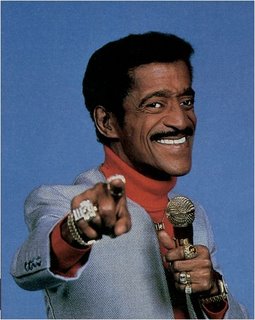
According to Bob Dylan in his "Devil" Theme Time Radio Show, Sammy joined the Church of Satan. I did not know that.
They wrote about and read about their friends, their opinions, their cats. (There was a lot about cats in the early blogs.)
There is still a bit of a sense in which having a Blogger address is like the AOL email addy of old, a scarlet mark on your credibility while the cool kidz are all on Wordpress or Movable Type. But not so much and I am happy to say it's a great system. Reliable (as much as anything on line is) and very simple to use. The design of my site is plain, but functional. Daggy, but I like it. If you are thinking of dipping in a toe, Blogger is a perfect platform.
To honour Blogger, here my first ever attempt at the traditional cat blogging:

According to Bob Dylan in his "Devil" Theme Time Radio Show, Sammy joined the Church of Satan. I did not know that.
Listen to the Stories
It is a country record featuring duets with Emmylou Harris, Dolly Parton, and Patty Loveless. Guest vocals also by Patty Griffin, Gillian Welch and David Rawlings, Gale West, and Regina and Ann McCrary. Players include Sam Bush, Al Perkins, Kenny Vaughan, Larry Campbell, Mickey Raphael, Kevin Welch, Paul Kennerley, Jim Lauderdale, Bryan Owings, Brady Blade, Phil Madeira, Byron House, Garry Tallent, and Chris Donohue.
Yikes. Solomon Burke's new album, produced by Buddy Miller. If that line up doesn't stir something deep, you are lost. I mentioned it before, here is the proof:
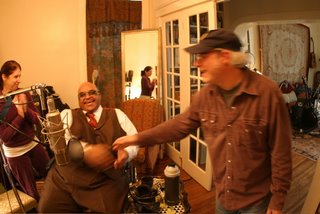
And some choice quotes from Solomon's website:
“After having my first country hit in 1960, I’ve always had a special desire to do a country album,” says Burke. “Really, it’s something I’ve wanted to do ever since I was a kid. I loved Gene Autry and Roy Rogers, Herb Jeffries – one of the first black cowboys. When I heard Charlie Pride I was just blown away. But after we did four country songs for Atlantic, Jerry Wexler said ‘We’ve got to stop that, got to get you back in R&B.’ I’m trying to ride a horse and they were trying to put me in a Cadillac! So to connect these new songs with the songs of my past, it’s really a circle I’m completing.”
Once upon a time, Charlie Parker was asked by a shocked fan why he liked country music. “Listen to the stories,” he replied. Solomon Burke, who describes NASHVILLE as “a reunion of heart, mind, and spirit,” echoes that sentiment. “The songs tell a powerful story, and these stories need telling in these times,” he says. “Listen to them two or three times and you really start to understand.
This will have to be a disaster not to be be the album of the year.
Yikes. Solomon Burke's new album, produced by Buddy Miller. If that line up doesn't stir something deep, you are lost. I mentioned it before, here is the proof:

And some choice quotes from Solomon's website:
“After having my first country hit in 1960, I’ve always had a special desire to do a country album,” says Burke. “Really, it’s something I’ve wanted to do ever since I was a kid. I loved Gene Autry and Roy Rogers, Herb Jeffries – one of the first black cowboys. When I heard Charlie Pride I was just blown away. But after we did four country songs for Atlantic, Jerry Wexler said ‘We’ve got to stop that, got to get you back in R&B.’ I’m trying to ride a horse and they were trying to put me in a Cadillac! So to connect these new songs with the songs of my past, it’s really a circle I’m completing.”
Once upon a time, Charlie Parker was asked by a shocked fan why he liked country music. “Listen to the stories,” he replied. Solomon Burke, who describes NASHVILLE as “a reunion of heart, mind, and spirit,” echoes that sentiment. “The songs tell a powerful story, and these stories need telling in these times,” he says. “Listen to them two or three times and you really start to understand.
This will have to be a disaster not to be be the album of the year.
Friday, August 11, 2006
Blog Gone Wrong
Once upon a time, I used to blog and it came easily and, sure, it was just light hearted nonsense done mainly to amuse myself and kill time but I did it and did it regularly. Dear readers, I have lost the blogging mojo. Once, I used to update pretty much daily, several times a day even. What did I blog about? How did I do it? I don't remember! I have been busy but that excuse only goes so far. Why can't I come up with anything even when I have a lot of time? I do have a plan to live blog my first listening of the new Bob Dylan album, but that is not for weeks. I have been doing CD reviews only because I can't come up with anything independently. Some nice, meaty longer pieces are in order. Or even stupid, meaningless shorter pieces. I am baffled, bemused, bewildered, bewitched and banging my head on the bloody keyboard.
I have been up nights thinking about ways to shake myself out of this cyber funk and I have come up with this.
You tell me what to do. I'm always much better at getting things done when I have a deadline and the crushing weight of expectation upon me. Tell me what you want to see blogged about (music related preferably) and I solemnly promise to do it, as quickly as I can.
Your mission is to save my blogging soul. Help me!
I have been up nights thinking about ways to shake myself out of this cyber funk and I have come up with this.
You tell me what to do. I'm always much better at getting things done when I have a deadline and the crushing weight of expectation upon me. Tell me what you want to see blogged about (music related preferably) and I solemnly promise to do it, as quickly as I can.
Your mission is to save my blogging soul. Help me!
Friday, August 04, 2006
Jason Collett
Idols of Exile
Arts and Crafts
My rule of thumb is this: if you can imagine it being used on the soundtrack of "Felicity", it is not alt.country. So neither is this album, despite what you might read. But that's OK. This bloke is the lead singer of the band Broken Social Scene who are some kind of indie big deal. As you see from my Felicity reference, the pulse of current culture has passed me by so I can't tell you about them. I will tell you that this is a very fine record of shiny rootsy folky stuff. Ron Sexsmith or Paul Westerberg sort of territory with a voice which has the pleading quality of a Bobby Bare, Jr. Yeah, a little Ryan Adams too. There is a banjo and lovely fiddle on "We All Lose Another", my stand out, but the album is strong right through. Sometimes this lush early '70s folk-pop sound really hits the spot, mostly the spot that used to regularly be on the verge of tears by the end of a Felicity episode.
Idols of Exile
Arts and Crafts
My rule of thumb is this: if you can imagine it being used on the soundtrack of "Felicity", it is not alt.country. So neither is this album, despite what you might read. But that's OK. This bloke is the lead singer of the band Broken Social Scene who are some kind of indie big deal. As you see from my Felicity reference, the pulse of current culture has passed me by so I can't tell you about them. I will tell you that this is a very fine record of shiny rootsy folky stuff. Ron Sexsmith or Paul Westerberg sort of territory with a voice which has the pleading quality of a Bobby Bare, Jr. Yeah, a little Ryan Adams too. There is a banjo and lovely fiddle on "We All Lose Another", my stand out, but the album is strong right through. Sometimes this lush early '70s folk-pop sound really hits the spot, mostly the spot that used to regularly be on the verge of tears by the end of a Felicity episode.
Subscribe to:
Posts (Atom)
